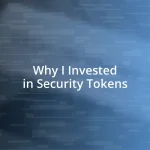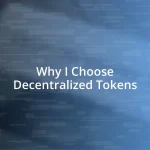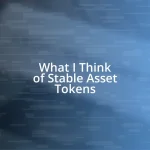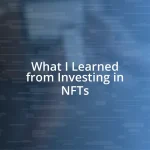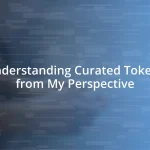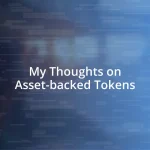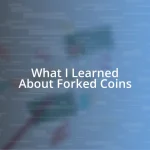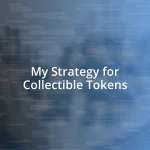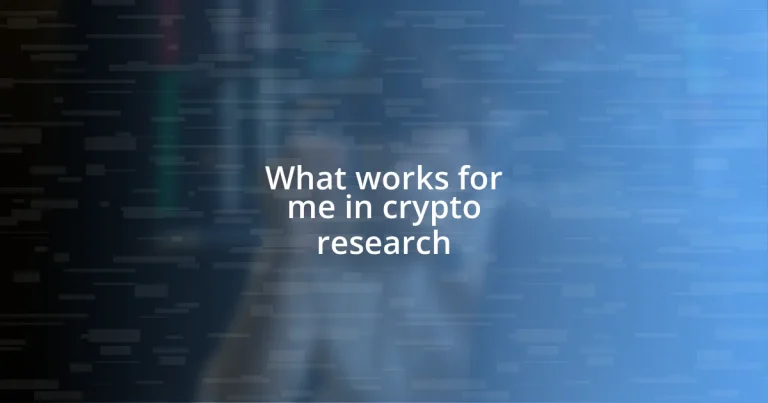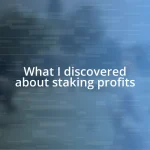Key takeaways:
- Start cryptocurrency research by identifying reliable sources and engaging with community input to shape investment strategies.
- Utilize essential tools like TradingView, CoinMarketCap, and Blockfolio for market analysis and portfolio management.
- Build a structured personal research strategy, incorporating a checklist, specific learning goals, and a research log for better decision-making.

Researching cryptocurrency effectively
When I dive into cryptocurrency research, I always start by identifying reliable sources. It’s like searching for a trusted guide in an unfamiliar city. Have you ever followed a lead only to find yourself lost? There are a lot of opinions online, but credible platforms like Coindesk, CoinTelegraph, or even academic journals lend a sense of realness to my findings.
Another thing I’ve learned is the importance of community input. I often find myself browsing Reddit or dedicated Telegram groups seeking advice or experiences from other investors. It’s rewarding to engage in discussions where people share their triumphs and mistakes. Does hearing about someone else’s journey influence your approach too? It definitely shapes how I view risk and innovation in the market.
Lastly, I make it a point to track market trends and sentiment analysis. I remember how a sudden dip caught me off guard once; it was a lesson in vigilance. Utilizing tools like Google Trends or platforms that aggregate social media sentiment gives me a broader picture. How can you make informed decisions if you don’t understand the climate? This active engagement helps me feel more prepared for the wild ride that is cryptocurrency investing.

Tools for cryptocurrency research
When it comes to tools for cryptocurrency research, I often find myself turning to charting software. These platforms, like TradingView, allow me to visualize price movements over time. I remember the first time I used it; the ability to spot trends visually changed how I approached my trades. Do you ever find that a picture truly is worth a thousand words? I think so.
Another indispensable tool in my research toolkit is CoinMarketCap. It’s a one-stop shop for checking market capitalization, volume, and circulating supply. I can’t tell you how many times I’ve been drawn to a project just to discover it was overhyped and didn’t have real backing. That moment of realization taught me the importance of digging deeper than surface-level data.
Finally, I can’t neglect the role of portfolio trackers like Blockfolio. These apps help me keep tabs on my investments in real-time. I remember vividly when I used to scribble down my trades on a piece of paper, only to lose track of opportunities. With these tools, I can make quick decisions on the fly and manage my portfolio dynamically. How do you manage your investments? Having everything in one place has made all the difference for me.
| Tool | Description |
|---|---|
| TradingView | Charting software for visual analysis of price trends |
| CoinMarketCap | Comprehensive data on market capitalization and project metrics |
| Blockfolio | Portfolio tracker for real-time investment management |
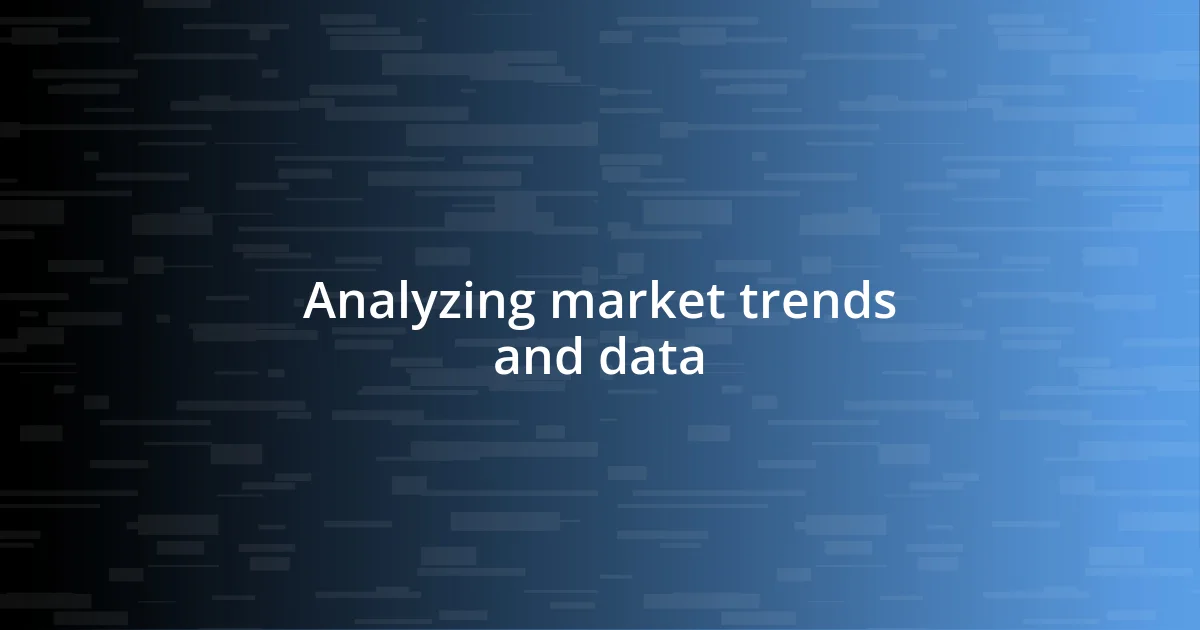
Analyzing market trends and data
I’ve found that analyzing market trends and data truly is vital in navigating the unpredictable nature of cryptocurrency. For instance, during the height of a bullish run, I noticed how sentiment shifted almost overnight—what seemed like unstoppable momentum turned on a dime. This experience taught me to keep a keen eye on market patterns and reactions. It’s fascinating how collective psychology can influence prices in ways we often underestimate.
Here are some key strategies I use to analyze market trends effectively:
- Identify patterns: I look at historical price movements to predict future trends, even if past performance isn’t always indicative of future results.
- Monitor trading volume: Increased volume can signify a potential price shift, reminding me to take a closer look whenever I see unusual spikes.
- Follow news cycles: Major events can impact market sentiment drastically, so I’ve learned to stay updated on global news that might influence coin values.
Each of these tactics serves as a compass in the crypto landscape, guiding my decisions in a constantly changing environment.
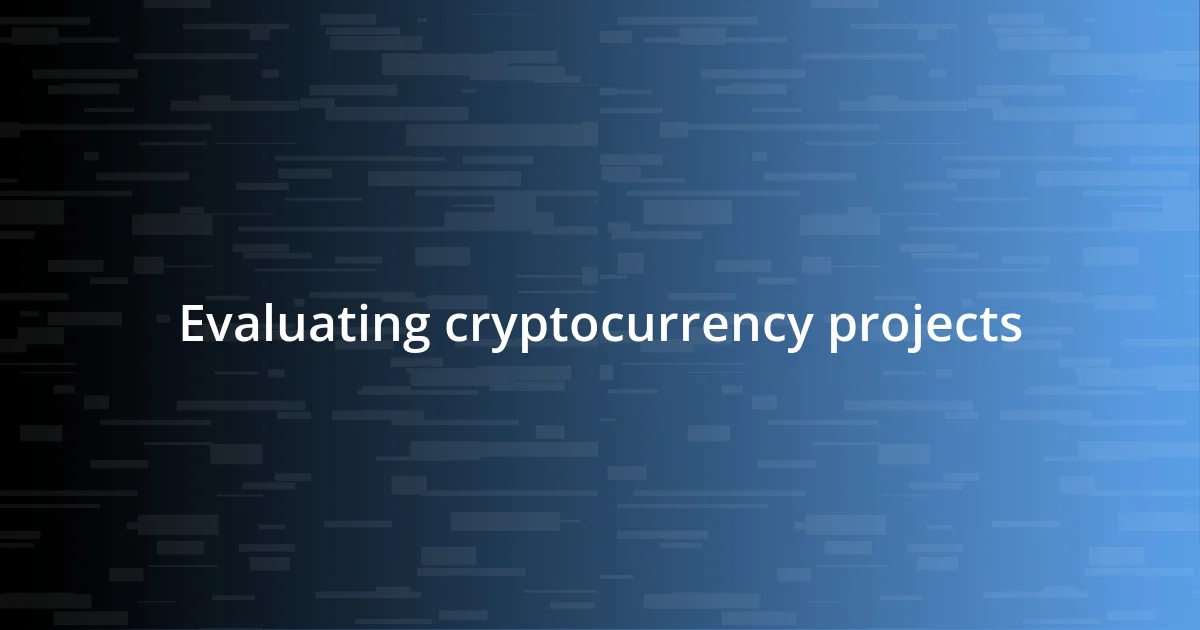
Evaluating cryptocurrency projects
Evaluating cryptocurrency projects involves diving deep beyond the flashy headlines. For me, the first thing I do is analyze the project’s whitepaper, which is essentially a blueprint of its vision, technology, and use case. I recall one time reading a whitepaper that turned out to be riddled with jargon but offered sparse details on how the technology actually worked. It was a real eye-opener; I’ve since learned to look for clarity and concrete examples rather than buzzwords that sound good but lack substance. Have you ever felt deceived by marketing hype?
Beyond the whitepaper, I also pay attention to the project’s team and their track record. I remember coming across a promising project led by a group of developers with a solid background in blockchain technology and successful startups. Their previous achievements gave me confidence in their ability to execute the vision. It’s like trusting a chef who already has a Michelin star; experience matters in this fast-paced industry, don’t you think?
Lastly, I keep a close watch on community engagement, particularly on platforms like Reddit or Telegram. Positive discussions and an active user base can indicate a project’s potential. However, I’ve often found that echo chambers exist; sometimes enthusiastic supporters overshadow legitimate concerns. Balancing this is crucial, and I always ask myself: Is there constructive criticism as well as praise? If a project encourages open dialogue, it often signals that they’re invested in long-term success.
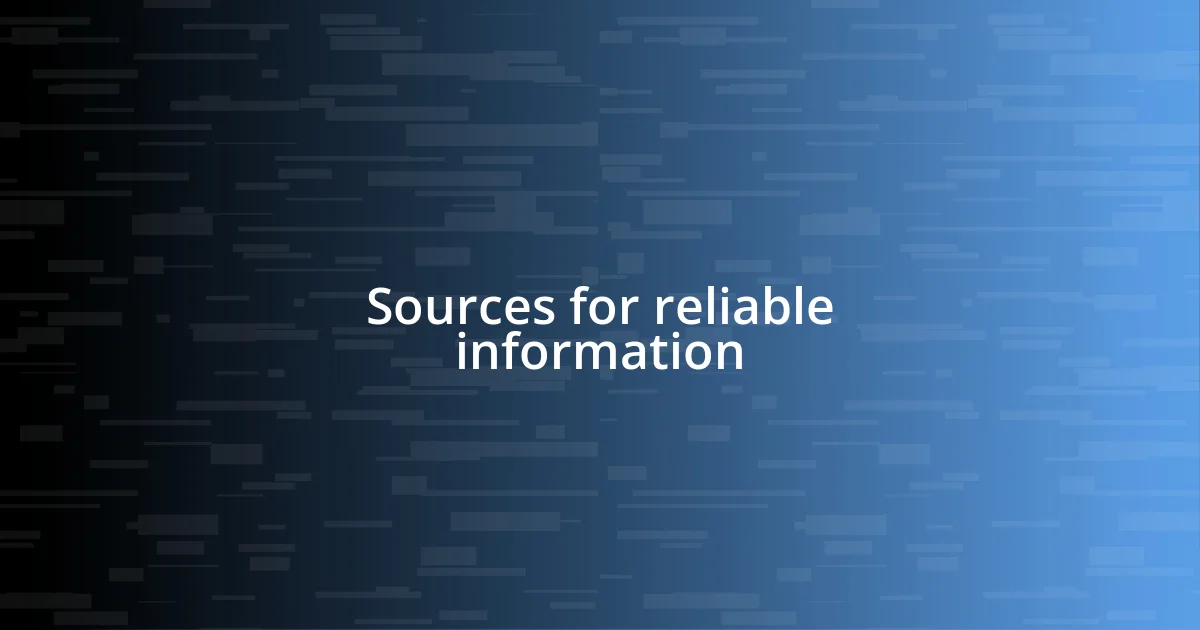
Sources for reliable information
When it comes to sourcing reliable information in crypto, I’ve found certain platforms to be invaluable. Websites like CoinDesk and CoinTelegraph offer news with a focus on blockchain and cryptocurrency trends, allowing me to glean context around market movements. I still remember the times I encountered breaking news on these sites that helped me make timely decisions, like selling a position just before a dip—a move that saved me from considerable losses. We all know how quickly a rumor can spread; without verified news sources, I’d feel lost in the chaos.
Additionally, I make it a point to follow trusted analysts on social media. Platforms like Twitter and LinkedIn feature voices that I trust based on their historical accuracy and thorough methodologies. One particular analyst I follow shared insights that caught my attention during a critical market downturn, suggesting that patience would pay off. Their analysis helped me resist the urge to panic-sell. Have you ever felt the tug of fear in a downturn, wondering if you made the right choice? Trusting these experts allowed me to stay grounded amid the storm.
Finally, attending crypto conferences and webinars has been a game changer for broadening my understanding. Interacting directly with experts and enthusiasts not only provides real-time insights but also a sense of community. I vividly remember attending a panel discussion where a seasoned investor highlighted the importance of due diligence. Their emphasis on verifying information aligns with my approach—if something feels off or too good to be true, I dig deeper. Don’t you agree that the more angles we can explore, the better equipped we are to make informed decisions?
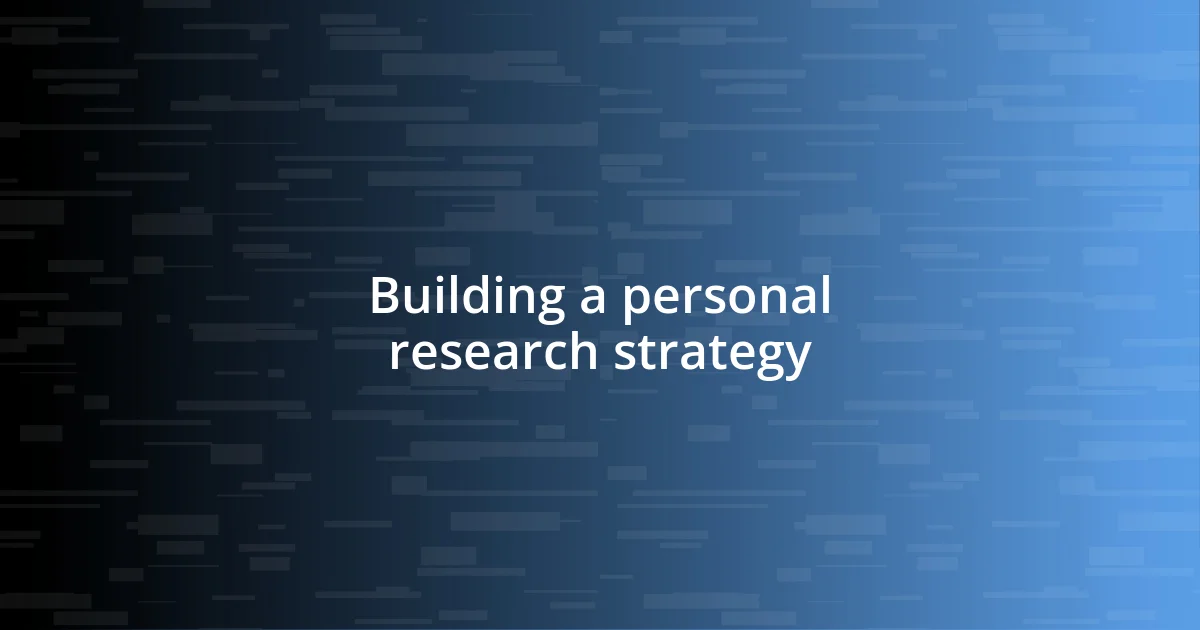
Building a personal research strategy
Building a personal research strategy in crypto isn’t just about gathering information; it’s about organizing my approach in a way that suits my investing style. For instance, I often start by creating a checklist that includes analyzing the project’s whitepaper, team credentials, and community sentiment. I remember the relief I felt when I developed this strategy—it provided structure in a sometimes chaotic landscape. Do you think a checklist could help streamline your own research efforts?
I also believe in setting specific goals for my research. When I began investing, I aimed to understand at least three different projects every week. Initially, it felt overwhelming, but there was something incredibly fulfilling about dissecting each project in detail. The more I learned, the more confident I felt. Isn’t it amazing how personal milestones can enhance our understanding and skills?
Lastly, I keep a research log, where I jot down my thoughts and insights about each project I explore. This has been a powerful tool for reflection. I recall a time when I doubted a project I had previously endorsed, but revisiting my notes helped clarify why I had believed in it initially. Writing things down not only reinforces my knowledge but helps me track my evolving thoughts over time. Have you considered the impact that journaling could have on your own investment journey?
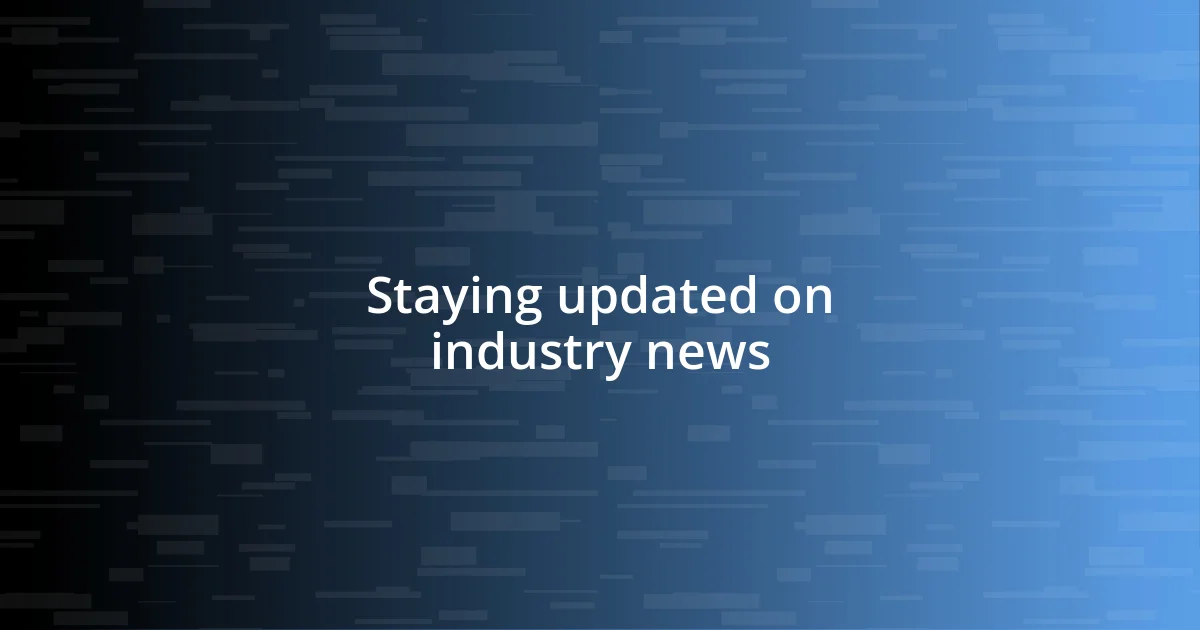
Staying updated on industry news
Staying updated on crypto industry news is essential for navigating the market effectively. I rely on a mix of news aggregators and niche newsletters to receive timely updates. I remember one time, I signed up for a newsletter from a crypto expert just before a major regulatory announcement. The insights I received allowed me to anticipate market reactions, proving that being in the loop can make a significant difference.
Another strategy I employ involves setting up Google Alerts for specific keywords related to cryptocurrencies that interest me. This way, I receive curated news as it happens. There was a period when I set alerts for upcoming blockchain projects and noticed a wave of buzz before they launched. It felt empowering to catch those early signals when others were still unaware. Have you considered how real-time alerts could transform your research process?
Finally, I make it a habit to engage in online forums, such as Reddit or Discord channels dedicated to crypto discussions. These platforms often highlight grassroots sentiment and rumors that aren’t covered by mainstream outlets. Once, I stumbled upon a thread discussing an emerging token that piqued my interest. Engaging in those discussions not only broadened my understanding but also connected me with other enthusiasts who helped refine my perspective. Don’t you find that community insights can provide a unique edge in the fast-paced world of crypto?
